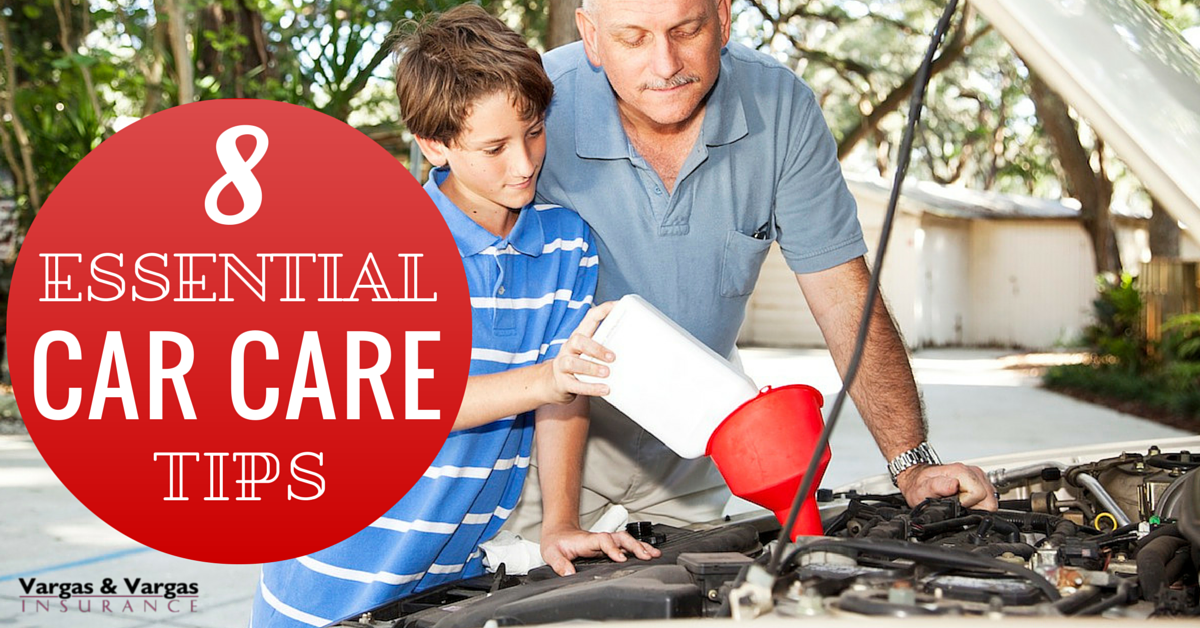Eight Essential Car Care Tips | Blog | Vargas & Vargas Insurance

You know how to take care of your body with good nutrition and regular exercise, but do you know these eight car care tips that will keep your vehicle healthy? Some of these maintenance tasks can even be done a home with some inexpensive materials and a little bit of training! If you make your car’s well-being a priority, it will continue to serve you for many years to come.
Regular Oil Changes – One of the best things that you can do for your vehicle is to ensure that it gets fresh oil on a regular basis. If you neglect your oil, it will begin to take a toll on your engine – something that no one wants to replace prematurely, especially when the preventative care is so cheap comparatively!
The Cooling System – Ensure that your coolant is changed annually. Make sure to follow your manufacturer’s instructions to do so, but a good rule of thumb is a 50/50 mix of coolant and distilled water. This will prevent corrosion and deposits from forming in your cooling system.
Transmission and Other Fluids – Your car requires several different types of fluids to run. Make sure that you are following your manufacturer’s recommendations for the types of fluids to use when it comes to things like the transmission fluids , and have them replaced regularly to keep your car healthy.
Lubrication is Key – Parts of your car need to move in sync in order to function. This is made possible with lubrication. Making sure that your engine is properly lubricated will help ensure that everything continues to move smoothly.
Wheel Bearing Service – Maintaining your wheel bearings is cheap and simple for most vehicles. What’s not cheap and easy is replacing your spindle and hub, or fixing your vehicle when a wheel detaches.
Brake Fluid Maintenance – Brake fluid is a peculiar substance because it’s attracted to water. Water is an enemy to metal, the main component of your vehicle. Replacing your brake fluid annually will keep moisture away from other parts of your car and prevent corrosion.
Wash Inside and Out – Your car deserves a good deep cleaning once in a while. Give everything a good vacuum and wipe down, and remember to rinse off the undercarriage (especially in the winter if there’s salt and debris under there).
Apply Wax Regular ly – Keep your car looking shiny and new (and protect your paint) with a fresh coat of wax every six months. You can do this yourself at home, or opt for a car wash that includes wax the next time you go to a local car wash for a scrub!
The one main point to take away from these eight tips is that preventative maintenance is cheap and easy, but fixing the issues that could otherwise arise is a huge (and typically expensive) task. Learn how to do some car maintenance yourself, or make regular appointments with your service provider to keep your vehicle healthy for years to come.
And here’s a bonus tip for keeping your car in tip-top shape: get a car insurance policy from Vargas and Vargas Insurance Agency! With a policy from our agency, you can rest assured knowing that you will be protected in case you get into an accident. Financial protection like that is hard to find, so call us at 617-298-0655 now to speak to a Massachusetts auto insurance expert about getting a free quote.


